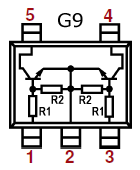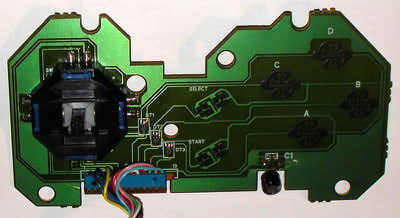Joypad: Difference between revisions
Jump to navigation
Jump to search
mNo edit summary |
No edit summary |
||
| Line 1: | Line 1: | ||
Joypads have 4 directions and | Joypads have 4 directions and 6 buttons switches. | ||
Registers used to read the button's states | Registers used to read the button's states: see [[Memory mapped registers]] | ||
The [[SYSTEM_IO]] ($C0044A) [[BIOS calls|BIOS call]] can be used to read joypads more easily: it sets values in the BIOS | The [[SYSTEM_IO]] ($C0044A) [[BIOS calls|BIOS call]] can be used to read joypads more easily: it sets values in the [[BIOS_RAM_locations|BIOS RAM]] which gives currently pressed, state change, and repeat values for both joypads. | ||
==NeoGeo CD joypads== | |||
[[File:G9pinout.png|right|thumb|"G9" internal schematic]] | |||
[[File:Ngcdpad.jpg|400px]] | |||
The NeoGeo CD joypads use membrane switches and springs for the 4 directions (replacement part ?) which directly set the corresponding inputs to ground. | |||
The buttons are buffered with 3, dual NPN digital transistors marked "G9" | |||
[[Category: controllers]] | [[Category: controllers]] | ||
Revision as of 02:25, 7 April 2012
Joypads have 4 directions and 6 buttons switches.
Registers used to read the button's states: see Memory mapped registers
The SYSTEM_IO ($C0044A) BIOS call can be used to read joypads more easily: it sets values in the BIOS RAM which gives currently pressed, state change, and repeat values for both joypads.
NeoGeo CD joypads

The NeoGeo CD joypads use membrane switches and springs for the 4 directions (replacement part ?) which directly set the corresponding inputs to ground.
The buttons are buffered with 3, dual NPN digital transistors marked "G9"
